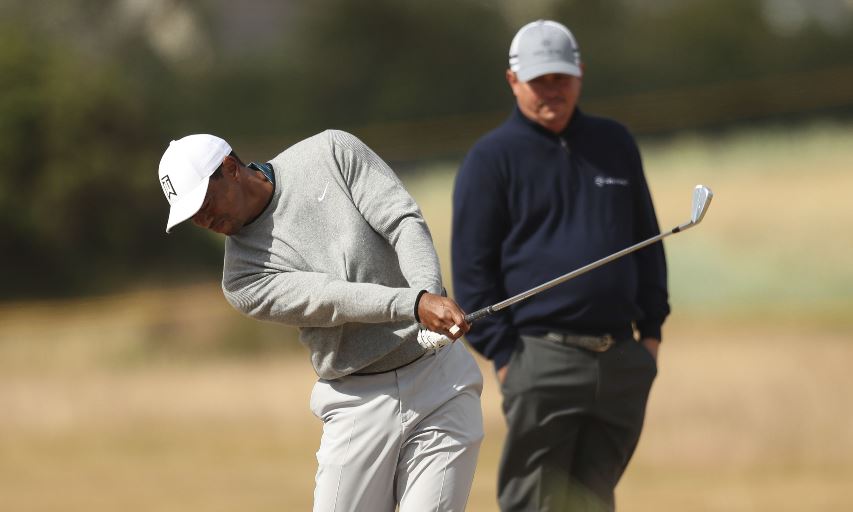Dufner Does The Math In Determining Success Rate
- Details
- Category: Inside Golf
- Published: 2018-11-14

By DOUG FERGUSON, Associated Press
ST. SIMONS ISLAND, Georgia — Jason Dufner scanned down both sides of the crowded practice range at Sea Island as he tried to find a spot to practice.
So many players, even if he doesn’t know all their names.
And so few trophies.
It was another reminder to Dufner that golf has a failure rate unlike most other sports.
The PGA Tour had 648 players tee it up in at least one tournament last year, and only 37 players went home with a trophy. Consider the winners-only start to the calendar year at Kapalua. From the 34-man field in January, 25 players have not made it back.
It doesn’t take an economics degree from Auburn to figure out that winning isn’t easy.
Dufner, who has such a degree, came up with his own version of success on the PGA Tour that at first glance seems outrageous.
“You win 2 percent of your tournaments, you probably have a Hall of Fame career,” Dufner said. “You throw in a major and win 2 percent of your tournaments, and you’re certainly in the Hall of Fame.”
Maybe he had Fred Couples or Mark O’Meara in mind.
Couples won 2.4 percent of his career starts on the PGA Tour, along with the 1992 Masters. He was inducted into the Hall of Fame five years ago. O’Meara won 2.4 percent of his PGA Tour events, plus two majors in 1998. He was inducted two years later. Another example is Davis Love III, who has won 2.6 percent of his tournaments with one major and was inducted last year.
Hall of Fame standards are hard to determine now because a 16-person panel of mostly golf administrators talk among themselves before voting who should get in. But the standard isn’t what it once was, nor should it be with a talent pool that is getting deeper with every year.
It’s getting harder to win.
That didn’t stop nine players from winning at least twice last season on the PGA Tour — Brooks Koepka, Dustin Johnson, Justin Thomas and Bryson DeChambeau each won three times — but in Dufner’s eyes, those are either exceptional players or exceptional years, sometimes both.
Dufner won twice in one season in 2012, the year before he won the PGA Championship. He now has five victories in 314 starts. That equates to winning 1.6 percent of his PGA Tour starts with one major. So the Hall of Fame is not in the picture.
“I better get going,” Dufner said with a laugh.
One measure of difficulty is who didn’t win this year, a list that includes Jordan Spieth, Hideki Matsuyama and Henrik Stenson, who all started the year among the top 10 players in the world.
Another measure is who ended long droughts.
The most famous is Tiger Woods, an exception in many cases. His victory at the Tour Championship was his first since 2013, and it followed four surgeries on his back. Phil Mickelson in Mexico City won for the first time since 2013. Matt Kuchar won last week at Mayakoba, his first on the PGA Tour since 2014. Keegan Bradley, whose two victories as a rookie included the PGA Championship, won the BMW Championship for his first PGA Tour title since 2012.
Former U.S. Open champion Webb Simpson crushed the field at The Players Championship for his first victory since 2013.
The key ingredient in Dufner’s model, of course, is playing long enough so that winning 2 percent of tournaments actually means something. And those who last that long usually build up scar tissue from all the times they failed to win.
Losing happens a lot.
Justin Rose and Johnson are among those who have made winning a habit. Johnson has won every calendar year since 2008 on the PGA Tour except for 2014. Rose has won every year since 2010 except for 2016, though he won Olympic gold in Rio de Janiero that summer.
“Winning every year is extremely tough to do,” Dufner said. “It’s just a fine line out here.”
How fine?
Dufner has a model for that, too.
“You have to have a 95 percent-plus success rate to win,” he said.
He defines success on a hole-by-hole basis in a negative sense. It’s more about what a player doesn’t do wrong as opposed to what he did right. Last week in Mayakoba, he said he had five penalty drops and three-putted three times. That’s not success. Dufner shot 13-under 271 and finished nine shots behind Kuchar.
“I probably had 15 or 20 shots that were not successful,” he said, estimating his success rate at 90 percent.
For the 309th time in 314 starts on the PGA Tour, he failed to win.
Then again, Dufner went over $26 million in career earnings. Failure is relative.



